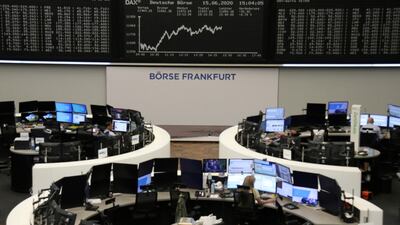European shares rose to a near two-week high on Tuesday as the latest economic data signalled a stronger recovery in business activity than anticipated from a coronavirus-driven slump.
The pan-European Stoxx 600 index rose 1.4 per cent as economically sensitive sectors such as banks, car makers and insurers rose between 2 per cent and 3.5 per cent.
Eurozone stocks rose 1.8 per cent after IHS Markit's Flash Eurozone Composite Purchasing Managers' Index (PMI) gave an early reading of 47.5 for June – a four-month high and a strong recovery from the 31.9 level recorded in May. A reading above 50 indicates an economy in expansion and below 50 contraction.
Germany's DAX jumped 2.3 per cent, France's CAC 40 rose 1.6 per cent and the UK's FTSE 100 rose 0.9 per cent after better-than-expected readings. The UK's Flash Composite PMI also rose to a four-month high of 47.6, up from a reading of 30.0 in May.
"It would no longer surprise me if the data is a surprise on the upside," said Daniel McDonagh, head of European portfolio management team at Pyrford International, part of BMO Global Asset Management.
"The big question still is whether we can proceed on the exit strategy from the lockdown in a smooth manner and really avoid a step backwards."
After a more than 35 per cent recovery from March lows, the Stoxx 600 has traded sideways in recent weeks as investors remain cautious about a second wave of coronavirus infections that could stall an economic rebound even as central banks and governments inject cash into the ailing economies.
Yet despite the positive readings, economists from IHS Markit stressed recovery prospects for both the eurozone economies and the UK remained uncertain.
“We remain very cautious of the strength and sustainability of any economic rebound,” Chris Williamson, chief business economist said of the eurozone. “The job market remains a particular area of concern, especially if demand fails to pick up sharply in coming months.”
With the outlook still uncertain, authorities are looking at ways to protect businesses and jobs as well as boost demand. In Spain, the government is weighing up plans to significantly increase the size of its €100 billion (Dh414.6bn) loan guarantee fund after the programme attracted huge demand, according to Bloomberg.
Although confidence is improving in the UK as lockdown measures ease, "the longer term recovery prospects remain highly uncertain", Mr Williamson said.
"Demand clearly remains weak, as indicated by a further steep decline in backlogs of orders and an ongoing fall in new orders. Many Covid-19 restrictions and social distancing measures will also need to stay in place until an effective treatment or vaccine is available, curbing demand in a variety of service sectors in particular," he said.
Uncertainty around employment prospects will also mean many consumers shy away from making big-ticket purchases, he added, with ongoing uncertainty around Brexit also continuing to cast a shadow over the economy.

